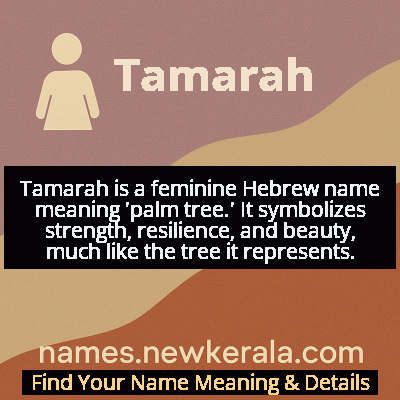Tamarah Name Meaning & Details
Origin, Popularity, Numerology Analysis & Name Meaning of Tamarah
Discover the origin, meaning, and cultural significance of the name TAMARAH. Delve into its historical roots and explore the lasting impact it has had on communities and traditions.
Name
Tamarah
Gender
Female
Origin
Hebrew
Lucky Number
8
Meaning of the Name - Tamarah
Tamarah is a feminine Hebrew name meaning 'palm tree.' It symbolizes strength, resilience, and beauty, much like the tree it represents.
Tamarah - Complete Numerology Analysis
Your Numerology Number
Based on Pythagorean Numerology System
Ruling Planet
Saturn
Positive Nature
Ambitious, efficient, realistic, and authoritative.
Negative Traits
Materialistic, stressed, confrontational, and can be overly ambitious.
Lucky Colours
Dark blue, black.
Lucky Days
Saturday.
Lucky Stones
Blue sapphire, amethyst.
Harmony Numbers
2, 4, 6.
Best Suited Professions
Business leaders, managers, financial services, law enforcement.
What People Like About You
Leadership, determination, organizational skills.
Famous People Named Tamarah
Tamara Taylor
Actress
Known for her role as Dr. Camille Saroyan on the TV series 'Bones'
Tamara Rojo
Ballerina and Artistic Director
Former principal dancer with The Royal Ballet and current artistic director of English National Ballet
Tamara de Lempicka
Painter
Renowned Art Deco painter known for her stylized portraits and nudes
Name Variations & International Equivalents
Click on blue names to explore their detailed meanings. Gray names with will be available soon.
Cultural & Historical Significance
Extended Personality Analysis
Women named Tamarah are often perceived as strong, resilient individuals with natural grace and dignity, much like the palm tree from which their name derives. They typically possess an inner strength that allows them to withstand life's challenges while maintaining their composure and elegance. These individuals often exhibit leadership qualities, combined with a nurturing spirit that makes them natural caregivers and community builders. Their personality tends to blend practicality with creativity, showing both grounded sensibility and imaginative thinking. Tamarahs are frequently described as loyal friends and family members who provide steadfast support during difficult times. They often demonstrate excellent problem-solving skills and the ability to adapt to changing circumstances while remaining true to their core values and principles. This combination of strength and flexibility makes them particularly effective in roles requiring both compassion and determination. Many Tamarahs display a natural elegance in their demeanor and approach to life, often serving as pillars of strength within their families and communities while maintaining a warm, approachable presence that draws others to them for guidance and support.
Modern Usage & Popularity
In contemporary times, Tamarah maintains a presence as an elegant and distinctive name choice, though it's less common than its variant 'Tamara.' The name enjoys moderate popularity in English-speaking countries and maintains stronger usage in Russian, Hebrew, and Slavic communities. Recent naming trends show a preference for biblical and nature-inspired names, which has helped sustain Tamarah's appeal. While not appearing on most popular baby name lists in recent years, it continues to be chosen by parents seeking a name with historical depth, cultural significance, and natural beauty. The name's spelling variation with an 'h' at the end adds a unique twist while preserving the traditional pronunciation and meaning. In Israel, the original Hebrew form 'Tamar' remains popular, while in Western countries, the name is often selected by parents looking for a name that is both traditional and distinctive, offering a connection to nature and heritage without being overly common.
Symbolic & Spiritual Meanings
The palm tree symbolism associated with Tamarah carries rich metaphorical meanings across various cultures. It represents resilience and endurance, as palm trees can withstand harsh desert conditions while continuing to grow and bear fruit. The tree's upward growth pattern symbolizes spiritual aspiration and connection to higher realms. In many traditions, the palm signifies victory, peace, and eternal life—in ancient Rome, palm branches were awarded to victorious athletes and military commanders. The palm's ability to provide shade, food, and shelter makes it a symbol of hospitality, generosity, and sustenance. Additionally, the palm tree's flexible yet strong trunk represents the ideal balance between adaptability and steadfastness, making it a powerful emblem of feminine strength that bends without breaking. In Christian iconography, palm branches represent martyrdom and spiritual victory, while in Islamic tradition, the date palm is considered a blessed tree mentioned numerous times in the Quran. The palm's seasonal fruit production also symbolizes fertility, abundance, and the cyclical nature of life.

